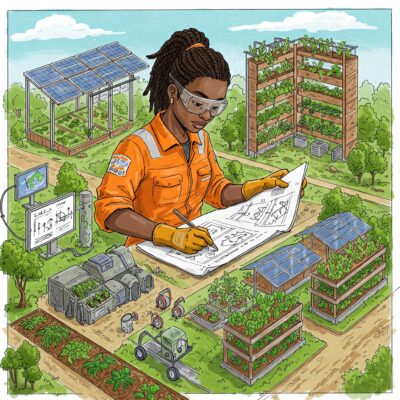Environmental scientists study the environment and address issues such as pollution, conservation, and climate change. They work to protect ecosystems and human health by providing solutions to environmental challenges.
What is a typical day in Civil Engineering?
– Conducting fieldwork to collect soil, water, or air samples
– Analyzing environmental data in a laboratory setting
– Preparing reports on environmental conditions and risks
– Advising policymakers, industries, or communities on sustainability practices
What else might they be expected to do?
– Develop environmental impact assessments for development projects
– Design strategies to mitigate pollution or restore ecosystems
– Educate the public on environmental issues
What type of training is needed for this career path?
– A Bachelor’s degree in Environmental Science, Biology, or Chemistry is typically required.
– A Master’s degree or PhD is beneficial for specialized roles or research positions.
– Certification in environmental management or sustainability can enhance job prospects.
What kind of personality is needed to excel in this career path?
– Detail-oriented individuals with a passion for nature and problem-solving thrive in this role.
– Big 5 traits: Openness and Conscientiousness are crucial.
– Myers-Briggs types: INFJ or ENFP often align well with this career.
What kind of interests do people in this career path have?
– A strong interest in nature, science, and sustainability (Investigative and Realistic traits).
– Desire to address global challenges like climate change and pollution.
– Interests & Aptitude: Investigative (I), Realistic (R), and Social (S).
Are there any innate skills or aptitudes required?
– Strong analytical and research skills
– Ability to work independently and collaboratively
– Passion for environmental conservation
What challenges can I expect to face if I pursue this career path?
– Balancing environmental concerns with economic or political constraints
– Dealing with unpredictable weather and field conditions
– Navigating regulatory and bureaucratic hurdles
What are the job prospects for this path in Kenya and Africa? What about International prospects for a Kenyan citizen?
– Kenya and Africa: Increasing demand for environmental scientists as governments and organizations prioritize sustainable development. Opportunities are growing in wildlife conservation, agriculture, and renewable energy.
– International: There is strong demand globally for environmental scientists, especially in countries focused on combating climate change and achieving sustainability goals.
What should I focus on if I choose to pursue this career?
– Gain expertise in environmental laws and policies.
– Build skills in data analysis tools and Geographic Information Systems (GIS).
– Participate in internships or volunteer programs in conservation or research.
Which other careers or job roles can I progress to?
– Environmental Consultant
– Conservation Scientist
– Climate Change Analyst
– Sustainability Manager
– Ecologist

